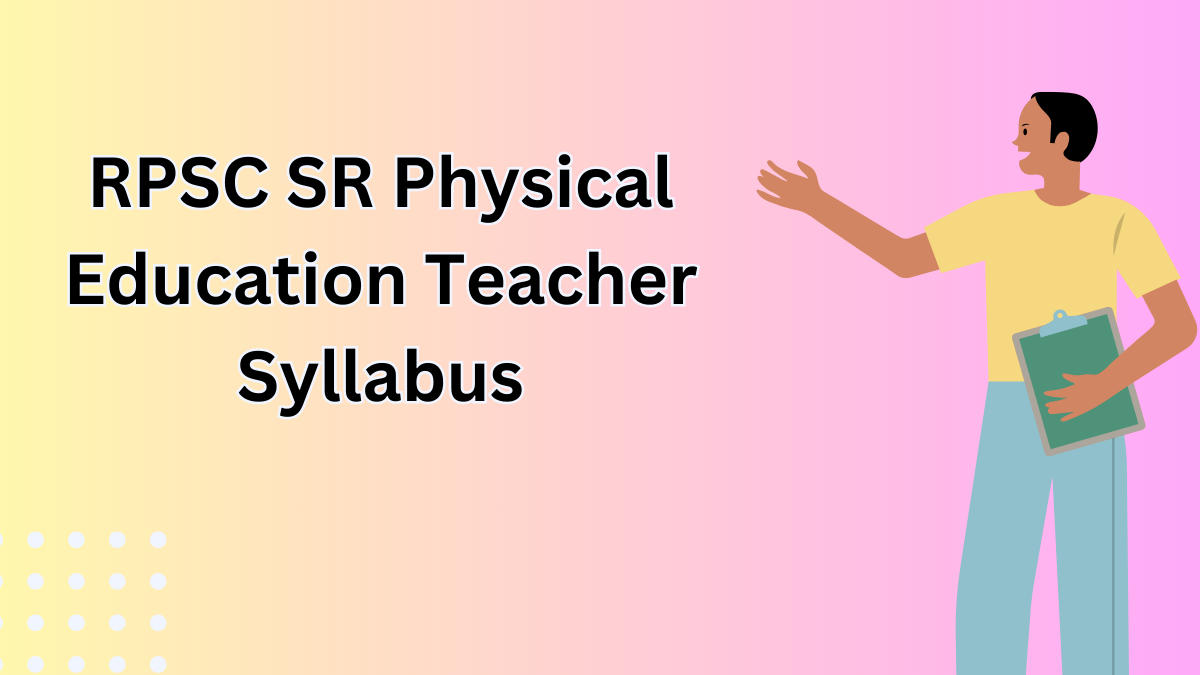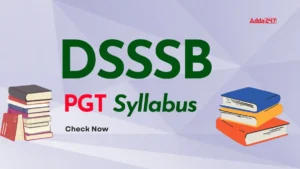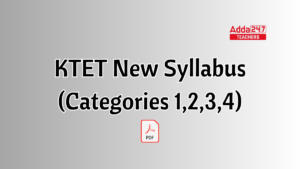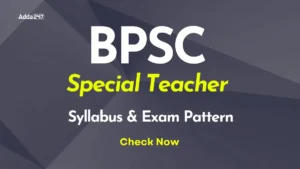Table of Contents
RPSC Senior Physical Education Teacher Vacancy has been released by the RPSC for 461 posts on their official website. The RPSC SR Physical Education Teacher Vacancy exam date will be released soon by the officials. Candidates should start preparing for the exam, and the RPSC SR Physical Education Teacher Syllabus and exam pattern will be helpful to achieve success. In this article, the candidates will find all the information about the RPSC SR Physical Education Teacher Vacancy in detail.
RPSC Senior Physical Education Teacher Syllabus
For further details on the RPSC SR Physical Education Teacher Vacancy Notification, the candidates can check out the following table.
| RPSC SR Physical Education Teacher Vacancy | |
| Organization | Rajasthan Public Services Commission |
| Vacancy name | Senior Physical Education Teacher |
| No of vacancy | 461 posts |
| Application Mode | Online |
| Category | Senior Physical Education Teacher Vacancy |
| Exam | 2 |
| Exam Centre | Various Districts of Rajasthan |
| Official website | https://rpsc.rajasthan.gov.in/ |
| Job Location | Rajasthan |
Rajasthan Physical Education Teacher Syllabus and Exam Pattern
RPSC will take 2 exam papers for the RPSC SR Physical Education Teacher Vacancy examination. The Exam Pattern for RPSC SR Physical Education Teacher Vacancy examination will help them to prepare to appear in 2 papers- Paper-I and Paper-II. Here is the Exam Pattern for the RPSC SR Physical Education Teacher Vacancy.
| Specifications | Paper-I | Paper-II |
| Total Questions | 100 Questions | 130 Questions |
| Total Marks | 200 Marks | 260 Marks |
| Marking Scheme | 2 marks will be awarded for each correct answer | 2 marks will be awarded for each correct answer |
| Negative Marking | ⅓ marks will be deducted for each wrong answer | ⅓ marks will be deducted for each wrong answer |
| Exam Duration | 2 Hours | 2 Hours |
| Type of Question | Objective Type Multiple Choice Questions | Objective Type Multiple Choice Questions |
RPSC Physical Education Teacher Syllabus
Paper 1 comprises Geographical, Historical, Cultural, and general knowledge of Rajasthan, Current Affairs of Rajasthan, General knowledge of the world and India, and Educational Psychology. Paper 2 comprises General Knowledge of Physical Education of Secondary and Senior Secondary standard, General knowledge of sports and Physical Education and current affairs, Theories, definitions and History of Physical Education, Education and Games Psychology, Methods, Supervision and Organizations of Physical Education, Theories of Training and Decisions, Science of basic Physical Anatomy, Function and Health Education and Entertainment, camp and Yoga. The detailed syllabus has been given below :
RPSC Physical Education Teacher Syllabus – Paper I
I. Geographical, Historical, Cultural, and General Knowledge of Rajasthan:-
- Physical features, climate, drainage, vegetation, agriculture, livestock, dairy development, population distribution, growth, literacy, sex ratio, tribes, industries, and major tourist centres.
- Ancient Culture & Civilisation of Rajasthan, Kalibangan, Ahar, Ganeshwar, Bairath.
History of Rajasthan from the 8th to the 18th Century
-
- GurjarPratihars
- Chauhans of Ajmer
- Relations with the Delhi Sultanate – Mewar, Ranthambore, and Jalore.
- Rajasthan and Mughals – Sanga, Pratap, Mansingh of Amer, Chandrasen, Rai Singh of Bikaner, Raj Singh of Mewar.
History of Freedom Struggle in Rajasthan
-
- Revolution of 1857.
- Political Awakening.
- Prajamandal Movements.
- Peasants and Tribal Movements.
- Integration of Rajasthan
Society and Religion
-
- Lok Devta and Devian.
- Saints of Rajasthan.
- Architecture – Temples, Forts, and Palaces.
- Paintings – Various Schools.
- Fairs and Festivals.
- Customs, Dresses, and Ornaments.
- Folk Music and Dance.
- Language and Literature.
- Political and Administrative System of Rajasthan:-
- Office of the Governor: Role and Functions.
- Chief Minister and Cabinet(State Council of Ministers).
- State Secretariat and Chief Secretary.
- Organisation and Role of the Rajasthan Public Service Commission.
- State Human Rights Commission.
- Panchayati Raj (Local Self-Government Administration).
- State Legislative Assembly in Rajasthan.
II. Current Affairs of Rajasthan:-
- Major current issues and happenings at the state level related to socio-economic, political, games, and sports aspects.
III. General Knowledge of World & India:-
- Continents, Oceans and their characteristics, global wind system, environmental issues and strategies, globalization and its impacts, population distribution and migration.
- India: Physical features, monsoonal system, drainage, vegetation, and energy resources.
- Indian Economy:- Growth and Development in Agriculture, Industry, and Service Sector in India. Foreign Trade of India: Trends, Composition and Direction.
- Indian Constitution, Political System and Foreign Policy:-
- Constitutional History of India with special reference to Government of India Acts of 1919 and 1935. Gandhi’s Contribution to the National Movement.
- Indian Constitution- Role of Ambedkar, making of Constitution, salient features, Fundamental Rights, Fundamental Duties, Directive Principles of State Policy.
- Offices of the Indian President and Prime Minister.
- Political Parties and Pressure Groups.
- Principles of India’s Foreign Policy and Nehru’s contribution to its making.
- India and U.N.O., emerging trends in International Politics with special reference to Globalization.
IV. Educational Psychology:–
- Educational Psychology– its meaning, scope, and implications for teachers in classroom situations.
- Development of Learner – concept of growth and development, physical, emotional, cognitive, moral, and social development.
- Learning – its meaning and types, different theories of learning and implications for a teacher, transfer of learning, factors affecting learning, constructivist learning.
- Personality – meaning, theories and measurement, adjustment and its mechanism, maladjustment.
- Intelligence and Creativity – meaning, theories and measurement, role in learning, emotional intelligence- concept and practices.
- Motivation – meaning and role in the process of learning, achievement motivation.
- Individual Differences – meaning and sources, education of children with special needs–Gifted, slow learners, and delinquents.
- Concept and Implications in Education of – Self concept, attitudes, interest& habits, aptitude, and social skills.
RPSC Physical Education Teacher Syllabus – Paper II
Unit 1. General Knowledge of Physical Education of Secondary and Senior Secondary Standards:
- Physical Education: Meaning, aims, objectives, scope, importance, and principles.
- Misconceptions about Physical Education, Modern concept of Physical Education.
- Biological Foundation: Heredity and Environment, Chronological, Anatomical, Physiological, and Mental Ages. Body types/Classification, Anthropometric measurements, Second wind, Oxygen-debt, and Kinesthetic sense.
- Psychological Foundation: Learning, Personality, Instinct, Emotions, Perception, Memory, Motives, and Motivation.
- Sociological Foundation: Leadership, Group dynamics, Socialization.
- Philosophical Foundation: Idealism, Pragmatism, Naturalism, Realism, Humanism, and Existentialism.
- Physical Fitness and Wellness: Warming up, Limbering down, Aerobic and Anaerobic activities, calisthenics, and Rhythmic exercises.
- Exercise programme for the development of the Whole Body.
- Changing Trends and Careers in Physical Education and Sports.
- Physical and health-related fitness components.
- Games and Sports as Cultural Heritage.
- Kinesiology and Biomechanics: History, aim, and their role in Physical Education and Sports.
- Law of Motion, Lever, Force, Axes and Planes, Center of Gravity, Projectile, Equilibrium, and their relationship with Sports. Kinematics and Kinetics of Human Movement.
- Postures and Common Postural Deformities.
- Therapeutic Modalities in Rehabilitation, Doping and Ergogenic Aids in Sports.
- Sports Massage: Effect and Types of Massage Manipulations.
- Prevention and First Aid for Common Sports Injuries.
Unit 2. General Knowledge of Sports, Physical Education, and its current affairs:
- Games/Sports: Athletics, Basketball, Badminton, Boxing, Chess, Cricket, Football, Gymnastics, Handball, Hockey, Judo, Kabaddi, Kho-Kho, Tennis, Shooting, Softball, Swimming, Table Tennis, Volleyball, Wrestling, Weight-lifting, and Wushu.
- History of the above Games/Sports.
- Latest general rules and skill test of the above Games / Sports.
- Measurement of play fields and specifications of sports equipment for the above Game/Sports.
- Fundamental skills, strategies, and tactics of the above Games/Sports.
- Related sports terminologies of the above Games/Sports.
- Proper sports Equipment for the above Games/Sports.
- Important tournaments and venues
- Sports Personalities and Awards
- Sports Associations/Federations.
- Ancient, Modern, and Paralympic Games.
- Schemes & Initiatives to promote Games & Sports in Rajasthan.
Unit 3. Theories, Definitions, and History of Physical Education:
- History of Physical Education in India: Pre and post-independence period.
- Physical Education in Greece and other countries.
- Contribution to the growth of Physical Education by following leaders: Baron Pierre de Coubertin, Johann Basedow, Gut Muths, H.C. Buck, G.D. Sondhi, Dr. P.M. Joseph, Prof. Karan Singh, and Prof. Ajmer Singh.
- M.C.A., Rajasthan State Sports Council, S.A.I., N.S.N.I.S., and National Fitness Corps.
Unit 4. Education and Games Psychology:
- Sports Psychology and Sociology: Definitions, nature, and scope.
- Growth and Development.
- Stress, Aggression, Anxiety, and Their Management.
- Psycho-physical unity and Sports Ethics.
- Self-esteem and Body image.
Unit 5. Methods, Supervision, and Organizations of Physical Education:
- Types of teaching methods, principles of teaching, presentation techniques, and principles of class management of Physical Education. Budget, Record, and Register.
- Lesson Planning: Types of lessons, objectives, and parts of lessons.
- Teaching Aids.
- Guiding principles, essential features, techniques, and qualities of supervision.
- Organization and Conduct of competitions and tournaments.
- Public Relations: meaning, importance in Physical Education and sports.
Unit 6. Theories of Training and Decisions:
- Sports Training: Principles and Methods.
- Training Load, Adaptation, and Periodization.
- Motor fitness components.
- Coaching: Meaning, Techniques, tactics, and Lead-up games activities.
- Officiating: Meaning, importance, and principles.
- Qualities, qualifications & responsibilities of Coaches, Officials, and Administrators.
Unit 7. Science of Basic Anatomy, Function, and Health Education:
- Anatomy and Physiology: Meaning and importance in Physical Education & sports.
- Cell, tissue, and organ.
- Bones and Joints: Definition, classification, and terminology of movement around joints.
- Structural and Functional Classification of Various Body Systems.
- Exercise Physiology: Meaning, need, and importance in Physical Education & sports. Effects of exercise on various Body Systems.
- Health: Dimensions, spectrum, determinants, and Positive health, Hygiene, community health, and aspects of school health services.
- Health Education: concept, objectives, importance, and principles.
- Food, nutrition, a balanced diet, and a diet according to sports activities.
- Health problems and Hypo-kinetic diseases in India.
- Diseases: Communicable, non-communicable, and hereditary.
Unit 8. Entertainment, Camp, and Yoga:
- Recreation: Definition, types, significance, and objectives.
- Theories of Play.
- Organization and Administration: Agencies offering recreation, facilities, equipment, and their maintenance.
- Types of Recreational Activities.
- Camping: Significance and types of camps, Selection and Layout of camp sites, Organization and administration of camps. Trekking and Rock-Climbing.
- Yoga: Meaning, types, stages, and significance.
- Patanjali’s Philosophy.
- Hath Yoga followed by Hath Pradipika and Gherand Sanghita.
- Assana, Pranayama, Bandhas, Shatkarma and Asthang Yoga.
- Management of diseases through Yoga.
Direct Link to Download RPSC Physical Education Teacher Syllabus
The direct link to download both exam syllabi of RPSC Physical Education Teacher in PDF format has been given below. The candidate can download the PDF, which will help them in preparation for the RPSC Physical Education Teacher Examination.



 DSSSB PGT Syllabus 2025 and New Exam Pat...
DSSSB PGT Syllabus 2025 and New Exam Pat...
 Kerala KTET Syllabus 2025, Download Subj...
Kerala KTET Syllabus 2025, Download Subj...
 BPSC Special Teacher Syllabus and Exam P...
BPSC Special Teacher Syllabus and Exam P...




